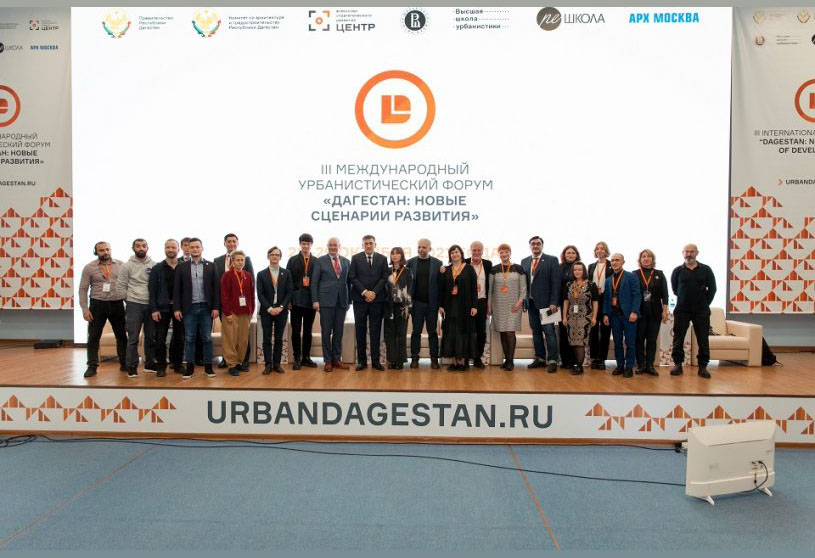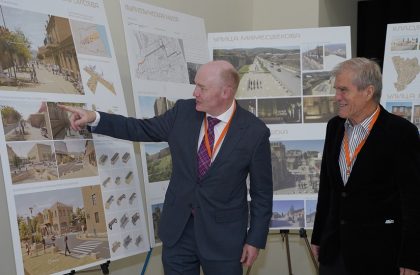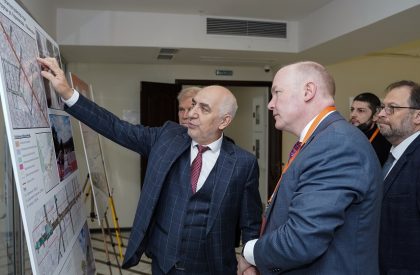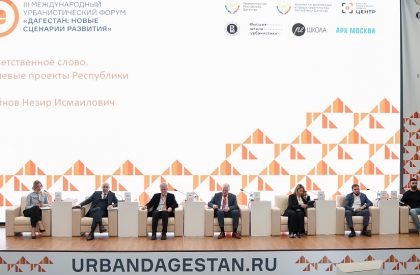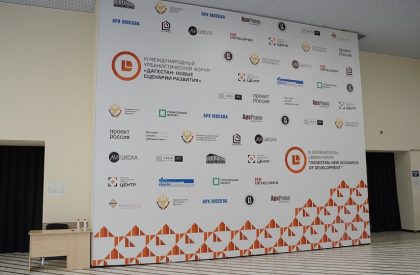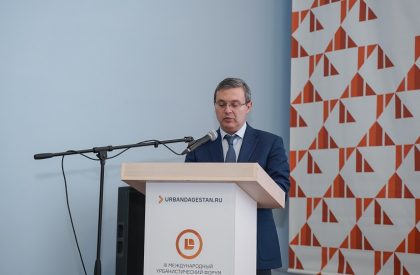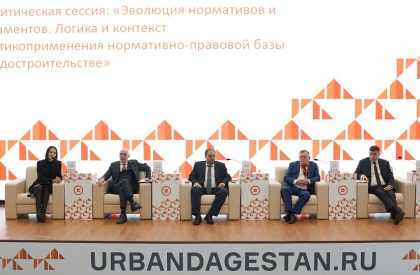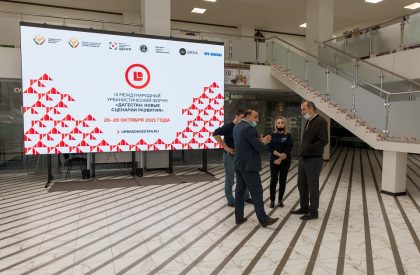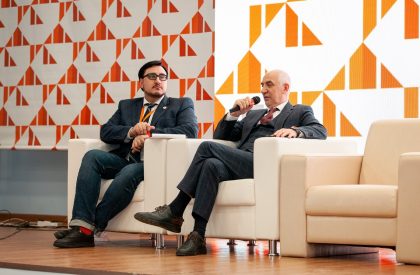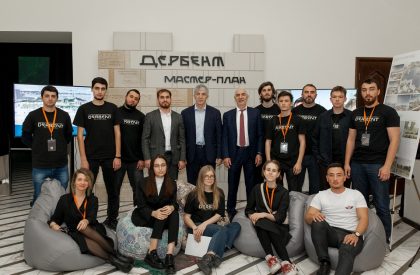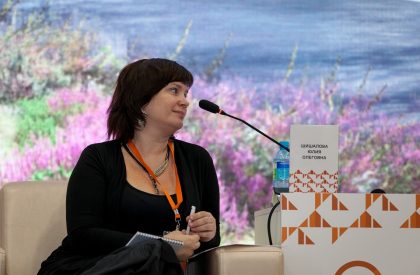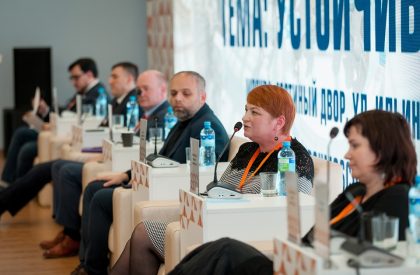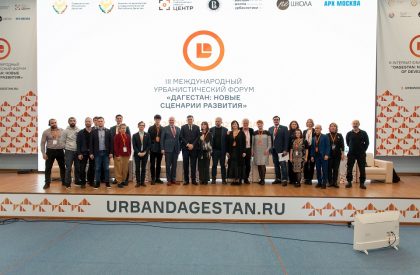Dagestan: New Development Scenarios – The 3rd International Urban Forum in Makhachkala has ended. On October 28 and 29, the city of Makhachkala in the Republic of Dagestan, Russia hosted the 3rd International Urban Forum “Dagestan: New Development Scenarios” at the “Russia, My History” Historical Park.
The forum was dedicated to integrated development of territories, modern design, and tools to create and develop a comfortable and modern urban environment.
The organizers were the Government of the Republic of Dagestan, the Committee for Architecture and Urban Planning of the Republic of Dagestan. The special partner was International Exhibition of Architecture and Design ARCH MOSCOW. The intellectual partner was the Russian-French School of Heritage Preservation and Revalorization RE-School. Partners were Vysokovsky Graduate School of Urbanism and the Higher School of Economics. The Forum’s Operator and Program Directorate was the Agency for Strategic Development CENTER.
This Forum has not just become a business platform where representatives of architectural, development, consulting and profile departments, agencies, and public organizations share experience and discuss issues of modern design, but also a meeting place for friends. Everyone was looking forward to the opening of the event. It was also attended by our foreign colleagues and friends: professor of Architecture at Belgrade University, urbanist Ljubisa Folic, chair of RuGBC green building council Guy Eames, and Austrian architect, founder of Daneshgar Architects Armin Mikhsen.
The “Modern public spaces – new symbols and points of attraction in cities and regions” Public Talk Forum began. The moderator was Maria Sedletskaya, head of the analytical group CENTER Lab of the International Urban Laboratory.
“Public spaces now include many functions, from education to entertainment. They must meet the needs of the population they are created for. It is important to design public spaces so that they can show the values of our cities and the republic as a whole. Today, we will talk about the main world trends in formation of public spaces, strategic priorities and principles of integrated territorial development, and much more. And, above all, we are interested in practical tools for the improvement of public spaces,” said Nezir Guseynov, Chairman of the Committee for Architecture and Urban Planning of the Republic of Dagestan.
During the “New approaches to the comprehensive development of territories: ‘smart’ space for living and working” discussion, the benefits and risks of implementing new CRT approaches to creating an urban environment that meets modern social and economic conditions and the interests of residents, businesses, and city authorities were discussed. The discussion was led by Yulia Shishalova, editor-in-chief of the Project Russia magazine.
At the “From results to new challenges and development goals. Where do you place bets?” plenary session, experts discussed new challenges for cities and territories of the Republic of Dagestan in the context of best Russian and world architectural, urban planning and urban practices. The plenary session was also attended by Manvel Mazhontz, acting deputy chairman of the Government of the Republic of Dagestan. Sergei Georgievskii, co-founder of CENTER Group of Companies, was the moderator.
There was also an exchange of views on the development of the territories in Dagestan. Principles and opportunities, strategic priorities of development of cities and territories, spatial and socio-cultural changes in the Republic were discussed, from achievements and new horizons, to architectural and urban policy in the rethinking of cultural and historical heritage.
“The evolution of standards and regulations. Logic and context of practical application of regulatory framework in urban development” session considered features of the regulatory framework in the regions, current tasks and principles of rationing, problems of applying standards, rules and regulations, ways to solve them, and much more. Evgeniya Murinets, member of the expert council of the Ministry of Construction on the formation of a comfortable urban environment, advisor to the Governor of Astrakhan Region, and director of the Urban Policy Institute, conducted the session.
Guests of the forum were treated to a very interesting cultural program – a visit to a rehearsal of the legendary Lezginka State Academic Honored Ensemble of Dagestan. The participants were welcomed by Dzhambulat Magomedov, director general of the ensemble and Honored Artist of Russia. During the meeting, dance compositions from Zolotoy Fond of Lezginka heritage were presented, and fragments of new productions were shown.
The second day of the Forum was no less eventful or interesting than the first.
It began with the “Models and institutions for the development of agglomerations as a basis for the balanced development of territories” session, and included the participation of Khizri Abakarov, Deputy of the State Duma of the Russian Federation.
“As mayor of the city of Derbent, I worked in conjunction with the head of the Department of Architecture of Dagestan. We were creating public spaces in a new format, and at that time I didn’t expect that they would have such a strong positive effect. We invited to Derbent architect Isa Magomedov, who was then working at the Department of Architecture of Makhachkala City Administration. He realizes many projects, all of them quite successful, and now Derbent is very popular among tourists. It is difficult to overestimate the work of architects and urban planners, I hope all your plans will be realized,” said Khizri Abakarov, deputy of the Russian State Duma.
Experts discussed the principles and practices of agglomeration management, and the need to create interconnected regional and municipal strategic planning documents to manage agglomeration development in the territory.⠀
They noted that agglomerations as an extension of the life cycle of cities and metropolises are emerging all over the world. Due to the concentration of resources, large agglomerations show high growth rates, become major drivers of the economy, and influence the world map. At the same time, the development of territories as agglomerations requires substantial public resources and managerial influence.
The session was conducted by Olga Gritsan, Head of the Analytics Department at the Agency for Strategic Development CENTER.
The “Territory of Childhood: schools, kindergartens, and playgrounds as the constructors of happiness” case-session was devoted to the architecture of tomorrow’s schools: new ideas, concepts, current trends in the development of the architecture of educational institutions, opportunities and limitations of design and construction work on “children’s” projects, and the socio-cultural and educational tasks that a school or university can solve through architecture. The moderator was Yulia Shishalova, editor-in-chief of the Project Russia magazine.
The forum was closed with the “Dagestan. Responding to Human Needs” session, where experts shared their views on the priorities of further development of Dagestan and suggested ways to preserve traditions and Dagestan identity.
Ljubisa Folic, urbanist and professor at the Faculty of Architecture, University of Belgrade, expressed hope for the preservation of Dagestan’s architectural identity. He proposed sending an official letter to UNESCO to include the ancient villages of Dagestan in the list of cultural heritage sites. The proposal was supported by all participants of the Forum.
Sergei Georgievskii, co-founder of CENTER Group of Companies, was the moderator of the concluding session.
An important event on the final day of the Forum was summing up the results of the face-to-face workshop “Seeing and loving Makhachkala in a day, or what makes up the image of the city?” of the Russian-French school of heritage preservation RE-School. Its head, Narine Tyutcheva, presented certificates to all participants of the workshop.
The agenda of the Forum will continue its development in Moscow at the ARCH Moscow Club, through professional and open discussions with leading experts in architecture, urbanism, urban design and management.
“I am very happy that this year, the ARCH Moscow exhibition has become a special partner of the Forum for the first time. I am glad that our cooperation will continue. The city of Derbent will be the guest of honor at the 27th International Exhibition of Architecture and Design ARCH Moscow. Moreover, there will be a separate exhibition devoted to the Republic of Dagestan. From June 8 to June 11, 2022, there will be a large business program at Gostiny Dvor over four days,” said the director of the International Exhibition of Architecture and Design ARCH MOSCOW, Evgenia Mikhaylidi.
More information about the forum can be found on the official website https://urbandagestan.ru/.
INFORMATION
Committee for Architecture and Urban Planning of the Republic of Dagestan
The committee is an executive body of the Republic of Dagestan, which implements state policy in the sphere of ensuring development of the territory of the Republic of Dagestan in terms of urban planning, including territorial planning, urban zoning, territory planning, as well as in the sphere of architecture and the formation of architectural and artistic appearance of the Republic of Dagestan.
International Exhibition of Architecture and Design ARCH MOSCOW
One of the oldest architectural and construction exhibitions in Moscow. Every year, leading foreign and Russian architects and designers present innovative solutions at ARCH Moscow in the field of private and urban design, construction and decoration of spaces. It is a meeting place for professionals and officials to discuss issues in modern architecture, a platform for architects and designers to talk to their clients, and a space for presenting new materials and technologies.
The Russian-French School of Heritage Preservation and Revalorization RE-School
This is a joint project of École de Chaillot, Rozhdestvenka architectural bureau, the Higher School of Urbanism of the Higher School of Economics, with the support of the Russian Ministry of Culture, the French Ministry of Culture and Franco-Russian Trianon Dialogue, initiated by Narine Tyutcheva. Mission: Formation of professional and personal involvement in historical heritage, use of the best international and Russian experience in the field of preservation and revalorization of cultural heritage sites, research, analytical, multidisciplinary approach to the formation of the learning process, participation in practical activities in the field of cultural heritage preservation, building up theoretical and technological research bases, and training of highly qualified specialists: architect restorers and civil servants in the field of protection and sustainable development of cultural heritage.
Vysokovsky Graduate School of Urbanism
Learning and research division of the Faculty of Urban and Regional Development of the Higher School of Economics. The mission of the Higher School of Economics is to create a center in Russia for education and research in the field of urban studies that meets the needs of cities in the 21st century and corresponds to the era of megacities. The key goal is to form an international-level research and design center focusing on the entire spectrum of issues faced by modern cities in the face of an avalanche in intensification of information flows, significant complication of all spheres of urban life, and the expansion of the creative, economic and social aspirations of residents.
Agency for Strategic Development CENTER
The Agency is a Russian analytical and consulting organization that works on multi-purpose projects in the sphere of development and urban planning, in addition to being one of the top operators of various architecture, urban planning, and design competitions. It deals with matters related to comprehensive land and real estate development and to the quality of the urban environment in more than 60 Russian regions. The company’s main specialization fields include: developing territorial development concepts and functional area programming; research and analytics; GR and public-private partnerships; professional competitions in urban planning, architecture, and design; organizing local events and educational programs; territorial branding.
Save
